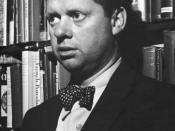Dylan Thomas' "Fern Hill" celebrates the simplicity of childhood, and yet is written in a complexity of language and symbols which aligns him with other modernist poets. Thomas uses an intricate pattern of repetition and sounds to create images of a bygone age of innocence that disappeared before the narrator could even realize what was happening. By examining this different form of verse that Thomas uses, and looking at the themes and imagery of "Fern Hill" one is able to see how Thomas is a modernist poet and the great skill in his work.
In his poetry Thomas works from emotion and "embodies a revolt against modern classicism, Oxbridge intellectualism, and the "King's English" of London" (Kershner, 120). "Fern Hill" is written from Thomas' own personal experiences, something for which he was highly criticized, but he uses his experiences to recreate the beautiful images that draw the reader in.
In his poetry Thomas used a full-throated rhetoric that some critics saw as "hypertension of vocabulary and rhythm masking impoverishment of theme" (Ellmann & O'Clair, 919). Poetic movements against his writing developed, such as Robert Conquest, and Philip Larkin as a response to this criticism.
In this poem he uses technical experiments with sound and the rapid succession of images to portray the beauty of nature and the influence of time. Thomas uses a new sort of verse that is romantic in a subdued way and Thomas is often considered a late romantic. Thomas does not "reflect the situation of the sensitive, intelligent individual in an uncongenial environment" (Kershner, 121). Instead he writes with a view of life that is "so radiantly aware of the sweetness of living" creating poems "written for the love of Man and in praise of god" (Ellmann and O'Clair,


